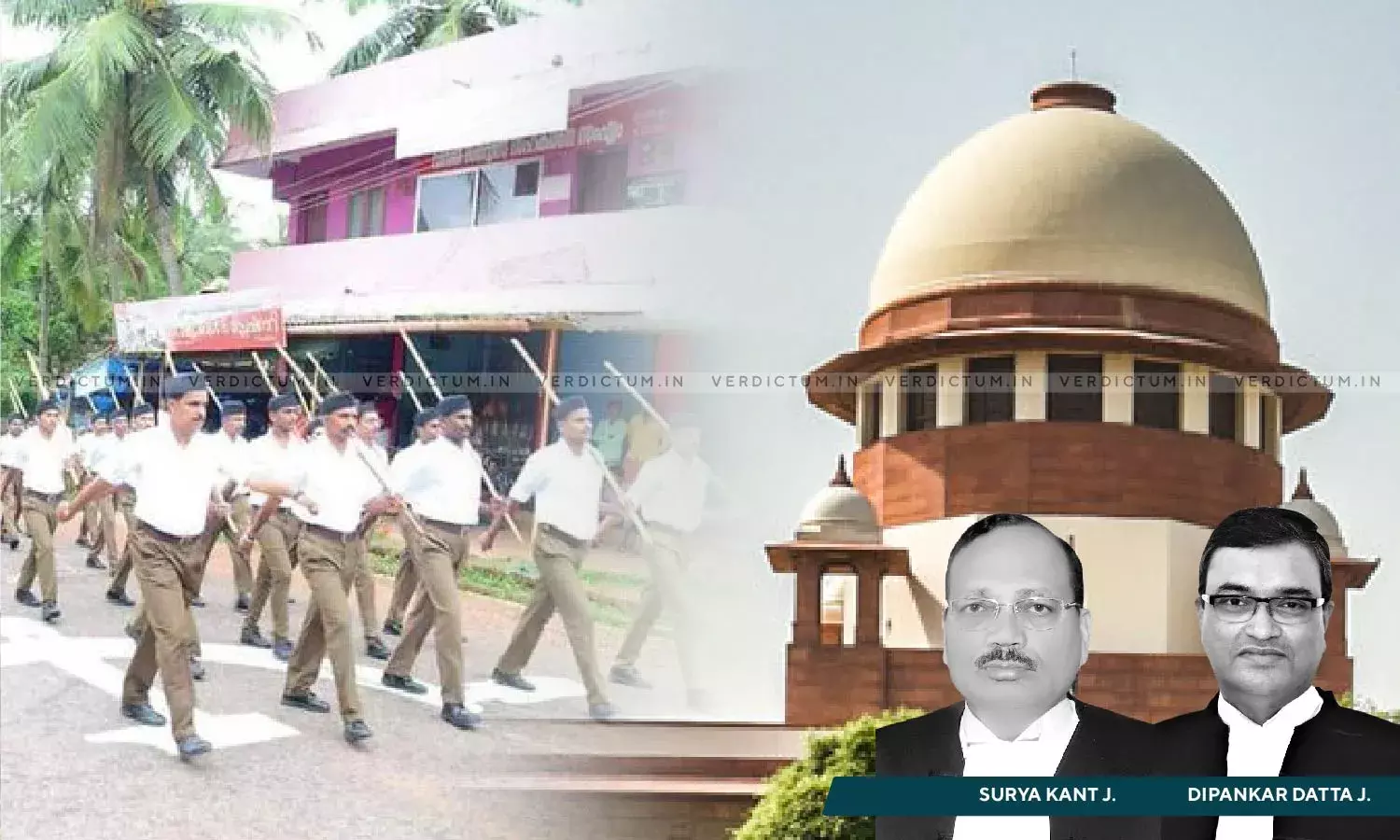We Are Going To Ask You Some Uncomfortable Questions: Apex Court Tells Tamil Nadu On Its Denying Permission For RSS Route Marches

Remarking that the Court will ask some uncomfortable questions on the merits of the matter to the Tamil Nadu Government if it finds that the Special Leave Petitions are maintainable, the Apex Court today adjourned to November 6, 2023, two SLPs challenging the Madras High Court's judgments granting permission to the Rashtriya Swayamsevak Sangh (RSS) to conduct route marches in all the requested locations.
The Bench comprising of Justice Surya Kant and Justice Dipankar Datta declined to issue a notice, however, adjourned the matter to Monday for the State of Tamil Nadu to provide clarification regarding the availability of an intra-court appeal in the High Court and address the question of maintainability of the SLPs before the Apex Court.
Justice Kant stated, "We are not commenting on the merits today but when you will convince us that it is maintainable then we will ask you certain questions, be ready for those. Today we are not on merits, first, we want to be convinced that this SLP is maintainable and that you don't have any alternative remedy. If we are satisfied that the SLP is maintainable, we assure you we are going to ask you some uncomfortable questions."
"We will give you some comfortable answers, I hope", replied Senior Advocate Kapil Sibal who appeared for the State of Tamil Nadu.
Sibal had at the outset submitted that "the High Court is now deciding whether or not to allow people to hold processions". This is entirely malafide, he submitted. "Now they have filed for contempt and we are in difficulty", he added.
When asked about an intra-court appeal, Sibal submitted that the contempt should not be decided till an intra-court appeal is filed. "That you can raise before the Division Bench", the Court replied. A Counsel appearing for the State then submitted, "When public order is involved, it is a criminal matter, there is no intra-court appeal".
"We will go by the roster. Was it heard by a Judge hearing criminal matters? If it is heard as a criminal writ, appeal will not lie. But if it is heard as a civil writ, an appeal will lie", Justice Datta said.
"Did the Judge have the authority to deal with Writs on the criminal side", the Court asked. "This is not writ under 482 of CrPC, it is under 226", it added. "We will produce those orders on Monday. If the appeal will not lie, we will be in great difficulty", said Sibal referring to judgments on maintainability of intra-court appeals.
"Why did you not file it as an SLP Criminal", Justice Datta asked. "We will produce the rules on Monday", Sibal said reiterating his request for an adjournment. Senior Advocate Guru Krishnakumar and Senior Advocate Madhvi Divan appeared for the Respondents, the Writ Petitioners before the High Court. Background
In the Special Leave Petition (SLP) filed by the State of Tamil Nadu through Advocate-on-Record Sabarish Subramanian, it was submitted that the High Court erred in granting permission to the RSS to conduct route marches in various areas of Tamil Nadu without due consideration of the history of violent incidents, the purposes and objectives of such marches, and the prevailing intelligence reports concerning potential incidents that could impact the law and order situation.
Tamil Nadu further contended in the SLP that the High Court orders were issued in complete disregard for the concurrent religious congregations occurring during the ongoing Navratri festival and Thevar Jayanti celebrations across Tamil Nadu. "Route maps of said marches are passing through narrow roads and also passing through the areas where places of worship of Minority Communities are situated", reads the SLP.
The SLP also states that RSS is an organization which is neither a citizen of India nor a Body Corporate and hence isn’t vested with the Fundamental Right guaranteed under Article 19 of the Constitution of India which is available only to the citizens of India. The State has also submitted that it has been held in several cases that the Police authorities have the power to refuse permissions for any processions in light of the prevalent Law and Order situation and the paramount security of the State.
Regarding the decision to deny permission for the marches, the State argues that taking into account the history of similar marches in various parts of India, including recent incidents in West Bengal and Haryana where such marches resulted in communal clashes, it was prudent to refuse permission.
Recently, the Madras High Court issued notice in a contempt petition filed against the State of Tamil Nadu for refusing to grant permission to the Rashtriya Swayamsevak Sangh. The Rashtriya Swayamsevak Sangh had moved the Madras High Court when the State did not grant permission, despite their application, to conduct route marches in different parts of the state on the occasion of Vijaya Dashami.
On October 16, 2023, the Principal Bench ordered the State to grant permission for the RSS route marches. In its judgment, the Court had found the reasons cited by the Advocate General on behalf of the state to refuse permission as "lame." The Court had stated that these lame reasons for denying permission exposed the inadequacy of the State machinery. On October 18, 2023, the Madurai Bench granted permission to RSS to conduct route marches in most Districts with condition.
Cause Title: The Director General Of Police v. K.Chandrasekar & Connected Matter [SLP(C) No. 24161-24176/2023 & SLP(C) No. 24234-24265/2023]

